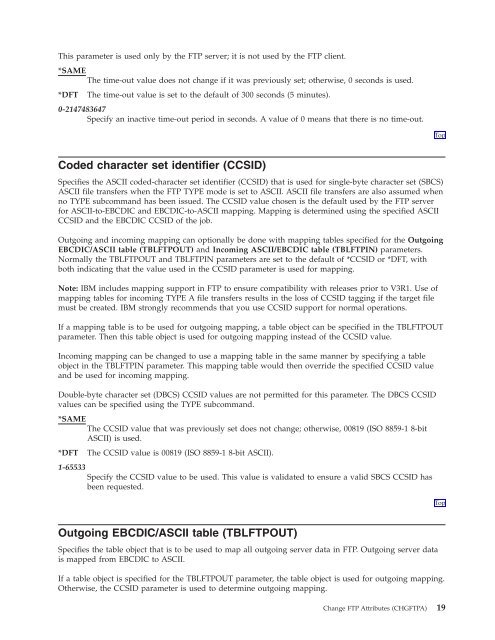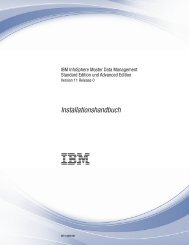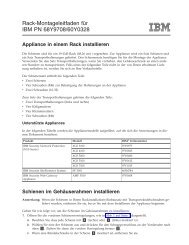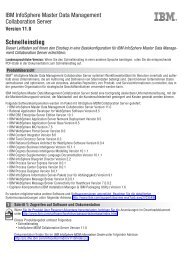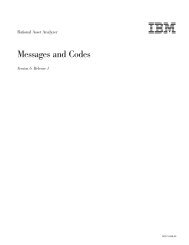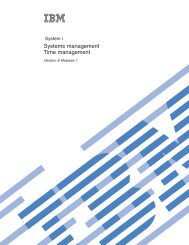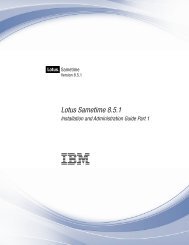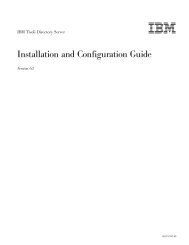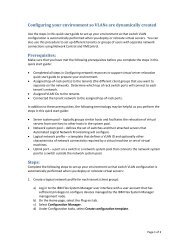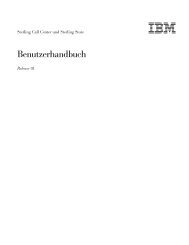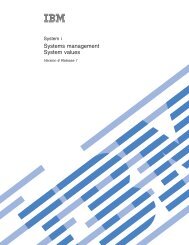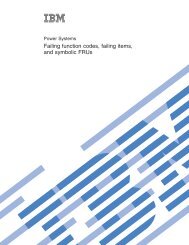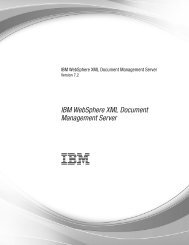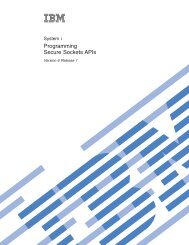TCP/IP Connectivity Utilities for i5/OS commands - IBM
TCP/IP Connectivity Utilities for i5/OS commands - IBM
TCP/IP Connectivity Utilities for i5/OS commands - IBM
You also want an ePaper? Increase the reach of your titles
YUMPU automatically turns print PDFs into web optimized ePapers that Google loves.
This parameter is used only by the FTP server; it is not used by the FTP client.<br />
*SAME<br />
The time-out value does not change if it was previously set; otherwise, 0 seconds is used.<br />
*DFT The time-out value is set to the default of 300 seconds (5 minutes).<br />
0-2147483647<br />
Specify an inactive time-out period in seconds. A value of 0 means that there is no time-out.<br />
Coded character set identifier (CCSID)<br />
Specifies the ASCII coded-character set identifier (CCSID) that is used <strong>for</strong> single-byte character set (SBCS)<br />
ASCII file transfers when the FTP TYPE mode is set to ASCII. ASCII file transfers are also assumed when<br />
no TYPE subcommand has been issued. The CCSID value chosen is the default used by the FTP server<br />
<strong>for</strong> ASCII-to-EBCDIC and EBCDIC-to-ASCII mapping. Mapping is determined using the specified ASCII<br />
CCSID and the EBCDIC CCSID of the job.<br />
Outgoing and incoming mapping can optionally be done with mapping tables specified <strong>for</strong> the Outgoing<br />
EBCDIC/ASCII table (TBLFTPOUT) and Incoming ASCII/EBCDIC table (TBLFTPIN) parameters.<br />
Normally the TBLFTPOUT and TBLFTPIN parameters are set to the default of *CCSID or *DFT, with<br />
both indicating that the value used in the CCSID parameter is used <strong>for</strong> mapping.<br />
Note: <strong>IBM</strong> includes mapping support in FTP to ensure compatibility with releases prior to V3R1. Use of<br />
mapping tables <strong>for</strong> incoming TYPE A file transfers results in the loss of CCSID tagging if the target file<br />
must be created. <strong>IBM</strong> strongly recommends that you use CCSID support <strong>for</strong> normal operations.<br />
If a mapping table is to be used <strong>for</strong> outgoing mapping, a table object can be specified in the TBLFTPOUT<br />
parameter. Then this table object is used <strong>for</strong> outgoing mapping instead of the CCSID value.<br />
Incoming mapping can be changed to use a mapping table in the same manner by specifying a table<br />
object in the TBLFTPIN parameter. This mapping table would then override the specified CCSID value<br />
and be used <strong>for</strong> incoming mapping.<br />
Double-byte character set (DBCS) CCSID values are not permitted <strong>for</strong> this parameter. The DBCS CCSID<br />
values can be specified using the TYPE subcommand.<br />
*SAME<br />
The CCSID value that was previously set does not change; otherwise, 00819 (ISO 8859-1 8-bit<br />
ASCII) is used.<br />
*DFT The CCSID value is 00819 (ISO 8859-1 8-bit ASCII).<br />
1-65533<br />
Specify the CCSID value to be used. This value is validated to ensure a valid SBCS CCSID has<br />
been requested.<br />
Outgoing EBCDIC/ASCII table (TBLFTPOUT)<br />
Specifies the table object that is to be used to map all outgoing server data in FTP. Outgoing server data<br />
is mapped from EBCDIC to ASCII.<br />
If a table object is specified <strong>for</strong> the TBLFTPOUT parameter, the table object is used <strong>for</strong> outgoing mapping.<br />
Otherwise, the CCSID parameter is used to determine outgoing mapping.<br />
Top<br />
Top<br />
Change FTP Attributes (CHGFTPA) 19


